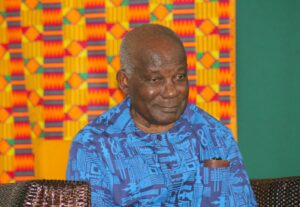Over partisanship is bane of Africa’s development – Professor Asare Opoku

Professor Kofi Asare Opoku, the Chairman of the Governing Council, African University College of Communication (AUCC), says the polarisation of society and excessive partisanship is bane to Africa’s development and “must be checked”.
He said despite adopting a multi-party system form of governance, there was an urgent need for African countries, including Ghana to come up with an indigenous system, which incorporated an African form of government to ensure the progress of Africa.
“We had our own forms of government so, we must incorporate ours into the modern system otherwise the governments we establish will not be viable,” Prof. Asare Opoku said in an interview with the Ghana News Agency after a public lecture at the AUCC to mark his 90th birthday.
Dubbed: “A Lesson of a Lifetime – What is past is but a small fraction of what is yet to come. The wisdom of our Ancestors”, the public event was interspersed with soothing Gyil (Xylophone) instrumentation combined with Dawuro (Idiophone) performed by the Abajo ensemble.
Prof. Asare Owusu, also the Chairman of the Advisory Council of the Pan African Heritage Museum, called on political scientists to study critically the African indigenous systems to ascertain how they worked in the past “instead of living on a borrowed and non-functional system”.
“Our ancestors say, borrowed water never quenches thirst,” he emphasised, and said there was a need for Africans to come up with their own ideas, study them and respect their own way of life for a viable political system that would serve as models for other continents to emulate.
He reiterated that: “We cannot always continue to borrow from the West; borrowing constitutions and systems, which won’t make any difference in our lives and that’s part of the reasons why we’re suffering”.
Prof. Asare Owusu, said there was no reason for Ghana to tie itself to a two-party system while abandoning the very traditional institutions that had kept society together.
He said: “We have been intellectually lazy because it is easier to borrow than to create; but we have to show that we are capable of creating a new system – a system that suits us as Ghanaians and Africans instead of following others”.
“The man who is fed on other people’s food is hungry, and the man who is dressed in other people’s clothes is naked,” he noted and explained that Africa had to get rid of the nakedness and the hunger by creating systems that were entirely Africa’s.
He said if Africa went the way it was headed, relying on others because of a seeming lack of confidence and believing that it could not do anything unless someone elsewhere came to its aid, then the “future would be bleak” with no hope.
According to him, if such misguided notions about the African were not disabused, “then we are making ourselves grass”, citing the Kenyan proverb that “If you make yourself grass, goats and sheep will feed on you”.
“Certainly, we are not grass, we can do more than we can think of,” he noted, and said it behoved on Africa to resolve to create its own governance systems with its rich and enviable heritage.
Such heritage, he admitted could die if not utilised, adding that: “It is our collective responsibility to come up with new systems and not continue to believe that we can rely on others. We can create our own jobs without depending on others. We must abandon the idea that someone has to support us before we can stand on our feet; that defeats our purpose in life.”
Professor Asare Osei said, “Our ancestors depended entirely on themselves. The reason we’re unable to do the same is because we have been made to believe that we can’t do anything without somebody coming to our aid. Sadly, we live in a borrowed religion, borrowed culture, borrowed food and many more. But these borrowings are suicide; they won’t get us anywhere.”
“After 66 years of Ghana’s independence, we live on borrowed governments, borrowed language, borrowed constitutions. It is time to be truly independent and stand on our own feet as a people. Yes, we can!” he said in a doleful but reassuring tone.
Source: GNA
